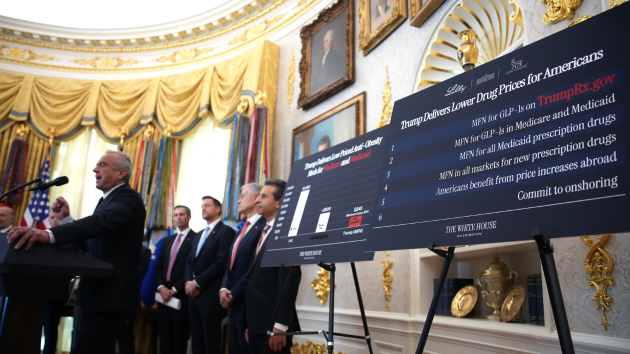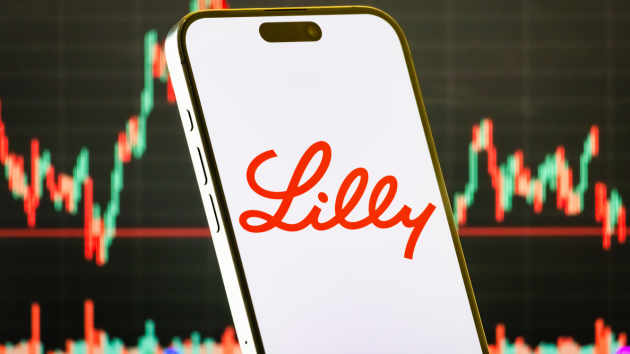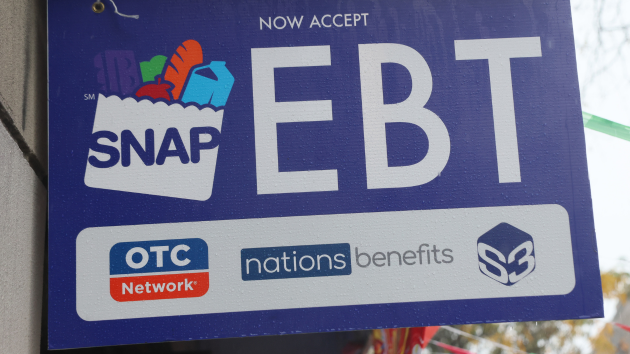Medicare recipients say new drug price negotiations will save them thousands
Written by ABC Audio ALL RIGHTS RESERVED on August 31, 2023

(NEW YORK) — Every month, Dawn LaGuerre has to decide which bills she’s going to pay or if she needs to cut back on groceries to be able to afford her monthly medications.
The 63-year-old from Utica, New York — 90 miles northwest of Albany — takes multiple drugs including Januvia and Novalog to manage her type 2 diabetes. Her husband, David, 61, also takes Januvia.
But her prescriptions have increased from $100 monthly to between $350 and $450 a month, leaving the couple to make tough financial decisions.
“Oftentimes, we do have to decide to pay a bill later, whether it’s my water bill or my electric bill, because I need those medications,” she told ABC News. “And without them, my health would be even more severely compromised. I can’t do without them…We really don’t have any discretionary money, and it’s putting us in the hole.”
LaGuerre’s circumstance is not uncommon — lowering prescription drug costs has become a bipartisan rallying cry for voters over the last few years. But this week, that movement saw a key victory that might bring some relief to LaGuerre and millions of other Americans.
For the first time, the Biden administration announced Tuesday that it would begin direct price negotiations on 10 widely-used drugs under Medicare, an attempt to drive down out-of-pocket costs for seniors.
The list includes medications for diabetes, heart failure and blood cancers including Eliquis, Enbrel, Entresto, Farxiga, Fiasp, Imbruvica, Jardiance, Stelara and Xarelto, as well as Januvia and NovoLog.
According to the U.S. Department of Health & Human Services, Medicare recipients who take any of the 10 drugs paid $3.4 billion in out-of-pocket costs in 2022.
President Joe Biden said the negotiated prices — which will go into effect in 2026 — will help lower costs for nine million Americans. The administration also plans to negotiate more drug prices through 2029, eventually expanding to 60 different medications.
LaGuerre said she feels the policy is throwing her and her family a lifeline.
“I’ll be having a little bit more money to pay toward those food items that we have to decide on, and I’ll be able to pay a lot of my bills with a lot more regularity without skipping them,” she said. “It’s really a big deal and for us, that would really be monumental because it would give us some kind of hope.”
The policy would also help people like David Mitchell, the founder of the group Patients for Affordable Drugs, and a cancer patient who relies on one of the drugs named Tuesday for lifesaving treatment.
He told ABC News he takes Eliquis, which treats and prevents blood clots. Annually, it costs $7,000 out of pocket, and since he pays so much money for other drugs, he actually buys a generic version from Canada that costs $1,700 per year.
“For people like me who take a drug like Eliquis, or a blood thinner, the potential savings could be thousands of dollars a year, and millions of people take Eliquis in this country,” he said.
Pharmaceutical companies have one month to decide whether they want to participate in negotiations, or risk facing a financial penalty. The penalty would be lifted, but only if the medication Is removed from the Medicare program completely.
Many of the drugmakers — including Bristol-Meyers Squibb, which manufactures Eliquis, Janssen Pharmaceuticals, which manufactures Xarelto and Merck, which manufactures Januvia — have all filed lawsuits, arguing the program violates the First and Fifth amendments.
In statements, several companies argued that lowering drug prices would hurt innovation and new drug development.
“The Inflation Reduction Act’s price-setting provisions are bad policy that will stifle the U.S. biopharmaceutical sector’s research and development, and have potentially devastating consequences for the millions of patients who need new therapeutic options,” Merck said in a statement to ABC News.
In fact, their innovation is in his best interest, Mitchell said, arguing that he wouldn’t push for price negotiations if he believed it would alter his treatment success.
“I have an incurable blood cancer, meaning no drug works forever for me,” Mitchell said. “I need them to invent new drugs that are different and have a different mechanism of action if I’m going to live as long as I hope to. That’s a fact. I would not cut off my nose despite my face. I’m not interested in dying from cancer.”
LaGuerre said if these medication prices don’t get negotiated down and those new prices don’t go into effect, she’s running out of options for how to pay for her medications and her living expenses.
“Somewhere down the road, I’m gonna have to make an incalculable decision, I may have to move out of my house, and try to find a cheaper apartment just so that me and my husband can afford our medicines,” she said. “I can’t afford to do without them. I think there’s enough skin in the game for [pharmaceutical companies] to be able to negotiate those Medicare costs so that all of us can have a chance at living.”
Copyright © 2023, ABC Audio. All rights reserved.

 KVSP
KVSP 




